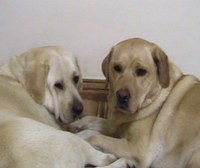Dogs, Diet Pills and Healthy Eating

Pfizer Animal Health announced today that the Food and Drug Administration (FDA) has approved Slentrol(TM) (dirlotapide) for the safe and effective management of canine obesity, making it the first and only veterinary-approved obesity drug for dogs in the United States.
Because of our intense interest in metabolism, we have been tracking the rise in canine obesity since 2001. Wild dogs do not get fat, but under-exercised canines given the wrong food rapidly do. Many owners think that they are too busy to exercise them and many neighborhoods either have no side walks or are simply not safe for a walk. Having just received multiple bags and boxes of food, I can also attest to something else: we often equate food with love – without being aware of the potential adverse health consequences.
According to 2002 data from the American Veterinary Medical Association 40 percent of dogs – around 17 million – are considered overweight (5 percent to 20 percent over ideal weight) or obese (20 percent or more over ideal weight).
Depending on the species, our canine friends get many of the same problems that we associate with overweight in humans: arthritis, heart disease, respiratory conditions and some cancers. Obesity can also worsen the signs associated with pre-existing diseases such as osteoarthritis. In addition, obesity can affect a dog’s quality of life by making exercise and play more difficult or even impossible.
The medicine is, quite rightly, designed to be used with a diet and exercise plan.
This new medicine does appear to be a real advance, and its mode of action very interesting. Indeed I am at this moment looking at a dog who might benefit!
But I also notice that a number of news outlets have reproduced the Pfizer press release verbatim, and presented it as a news item.
What Pfizer said is 100% accurate, but when the media reporduce something without comment I worry that this is an example of “fake news.“
It is interesting to me that this story was released two days after the release of a report from researchers at the University of Alberta Hospital that has just been published in the Lancet.
Their conclusion? That we need better data on the long-term effects of anti-obesity drugs before more widespread use of the therapies. We need to know not just if a medicine leads to weight loss, but whether it leads to clinical benefit. We saw this with the recent tragedy with the medicine torcetrapib. This was a medicine designed to increase levels of HDL-( “good”) cholesterol. Indeed it does, but more people taking it died in a clinical trial, which was then stopped.
I am often asked, “Wouldn’t it be great if we could do anything that we wanted and then to take a pill to cancel out the effects?”
The answer to that one is surely a big, “No!”
Fortunately such a solution – which would destroy personal responsibility – seems to be years in the future.
If ever.
We MUST take responsibility for the things that we do.
To do anything less is to accept the fantasy that we are no more than machines at the mercy of our brain cells.
We are all far more than that.
And deep down we all know it.






